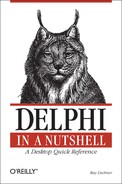Name
Try Keyword
Syntax
tryStatements... finallyStatements... end; tryStatements... exceptStatements... end; tryStatements... exceptHandlers... end;
Description
The try keyword introduces a
try-except statement or a
try-finally statement. The two
statements are related but serve different purposes.
The try-finally statement is
used to manage memory and other resources. It performs the statements
first in the try part of the statement, then in
the finally part of the statement. The statements
in the finally part are executed no matter how
control leaves the try part: exception, returning
from a subroutine with the Exit procedure, or
exiting a loop with the Break procedure.
The try-except statement
handles errors and exceptional conditions. It first performs the
statements in the try part of the statement. If an
exception is raised, control transfers to the
except part of the statement, where Delphi
searches for a matching exception handler. If the
except part contains plain statements, Delphi
executes those statements, and then control continues after the end
of the try-except statement. If
the except part contains one or more exception
handlers (which start with the on directive),
Delphi searches for a matching handler. If it cannot find a matching
handler, control continues with the next
try-except statement in the
call stack.
Tips and Tricks
Use
try-finallyto free temporary objects and other resources and to perform related cleanup activities. Typically, you should not need more than onetry-finallystatement in a subroutine or method.Use
try-exceptto handle exceptional cases. In utilities and reusable classes, you should rarely usetry-except. Instead, an application usestry-exceptto catch specific exceptions and do something useful with them, such as log them in an error log, send email to the vendor, or create a friendly dialog box.Low-level code might use
try-exceptto catch a low-level exception, add information, and raise a higher-level exception.
Example
// Copy a file. procedure CopyFile(const DestFile, SourceFile: string); const ReadFlags = fmOpenRead or fmShareDenyWrite; resourcestring sSourceError = 'Cannot open source file: %s'; sDestError = 'Cannot open destination file: %s'; sCopyError = 'Cannot copy %1:s to %2:s: %0:s'; var DestStream, SourceStream: TStream; begin DestStream := nil; SourceStream := nil; try try SourceStream := TFileStream.Create(SourceFile, ReadFlags); DestStream := TFileStream.Create(DestFile, fmCreate); DestStream.CopyFrom(SourceStream); except // EFCreateError and EFOpenError derive from EStreamError, // so check the derived classes first. Raise a new exception // that provides additional information. If any other kind // of exception is raised, the exception propagates to the // caller and its caller, until Delphi finds another exception // handler. on Ex: EFCreateError do raise EFCreateError.CreateFmt(sDestError, [Ex.Message]); on Ex: EFOpenError do raise EFOpenError.CreateFmt(sSourceError, [Ex.Message]); on Ex: EStreamError do raise EStreamError.CreateFmt(sCopyError, [Ex.Message, SourceFile, DestFile]); end; finally // Even if the try-except raises an exception, the finally // part executes, so the stream objects can be freed. DestStream.Free; SourceStream.Free; end; end;
